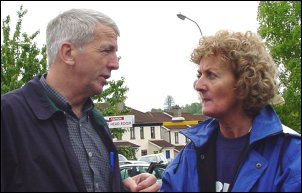 Dermot
Duignam - Mr. Rás Dermot
Duignam - Mr. Rás
By Gerard Cromwell
In 1956, a young Dermot Dignam embarked on a
cycling career that would eventually lead to him being a household name in Irish
cycling circles, although maybe not in the way he imagined when starting out. A
good sprinter, Dignam won numerous ‘gallops’ in the Phoenix Park as well as
races such as Ras Gaillimh in Galway.
In 1959 he found himself riding in his first Ras
Tailteann. He was to take part up until 1962 and after a few years away from
cycling, when marriage and ‘little Dignams’ took priority, he rode again in
1972.
In 1961 he finished 7th overall in the Ras and his
best stage result came in Navan where he finished second, sandwiched between two
legends of Irish cycling, Paddy Flanagan of Kildare and Shay O’Hanlon of
Dublin. Dignam also finished 4th on six various stages during his Ras career.
When Joe Christle retired from running the Ras in
1972, Dermot found himself on the executive council of the now defunct National
Cycling Association and was asked with seven others if he would like to help run
the race. He became route organiser that year and held that position up until
1979, when Jim Kelly and Paddy O’Callaghan respectively gave up their posts
and Dignam became race organiser, a position he has held to the present day.
To organise an event as big and as long as the FBD
Milk Ras is a huge undertaking. Unlike other sports events, it does not take
place within the confines of a stadium or football ground. The Ras is constantly
on the move, over all kinds of terrain, from villages and cities through bogs
and across mountains, in all kinds of weather.
Throughout the nine day event, almost two hundred
cyclists and their backup crews, neutral service crews, motorbike marshals,
ambulances and race doctors, gardai, route markers, barrier crews, results
officials, photo finish crews, P.A announcers, judges, timekeepers, commisaires,
press, radio and television crews all have to be fed, watered and accommodated
in some of the 450 beds that the race takes up each night.
“The first Ras that I organised was a lot easier
than nowadays.” says Dignam. “There were less foreign teams, so the
logistics were a bit simpler. The roads are far busier nowadays too. The pace of
Irish life has increased, there are a lot more cars on the road and drivers are
far less tolerant. The legislation covering safety at sports events is also
beginning to impact on the race. You have to have safety statements, event and
traffic management plans. Luckily, my son Conor is a barrister, so he helps out
with any of the tricky legal problems we may encounter.”
The Ras route also has to be planned months in
advance. “I would usually start planning a route in July of the previous year.”
says Dignam, “I would then approach the local cycling clubs, town committees,
chambers of commerce and tourist committees for any help they can give me. I
would cover the full route at least four times in total, before the start of the
race in May, the following year.”
Even though he has been organising the Ras for over
twenty years now, the stress and strain of such a big undertaking still catches
up with him in the weeks leading up to the start of the race. “Usually the
nightmares start about a month before the start of the Ras.” He laughs. “But
the days and nights leading up to the start are just so busy I literally don’t
have time to be nervous.”
Dignam has a well-drilled support team alongside
him as the big day draws near. “In the months beforehand, Eddie Dawson is
invaluable in arranging all the accommodation. I would be lost without Seamus
Shortall and his Rapid Results service, Jack Watson and Maurice Murphy for their
technical advice and of course my wife Geraldine, daughters Brona, Eimer and
Deirdre and my son Conor, who all have to eat, sleep and drink the Ras in that
period.”
Once the race gets underway, an even bigger crew
pull together to make one tightly knit unit. “It’s thanks to the effort,
commitment, generosity and idealism of all the volunteer workers involved with
the Ras that the race is such a success. The tireless effort put in by the race
officials, team personnel, Gardai, sponsors, stage end committees and everybody
involved with the Ras is invaluable and I sincerely thank them.”
Each year, at some point in the race, Dermot Dignam
thinks to himself; ‘never again, it’s just too much to do’. This year he
was sitting on a couch in a hotel in Longford before the start of stage two and
was deep in conversation with one of the race officials when he mentioned
something about next year’s Ras. He stopped himself, turned to me and said “There
you go. Every year I say - that’s it. No more. But in my subconscious, I’m
probably already planning routes and organising things.” When I asked him how
long he planned on running the race, he answered “God knows!”
Let’s hope that Mr. Dignam’s subconscious will
keep getting the better of him for a good many years yet!
|